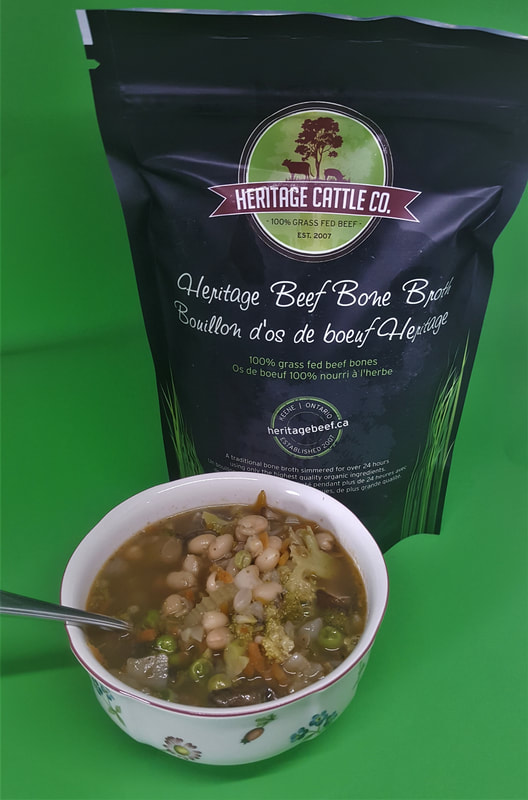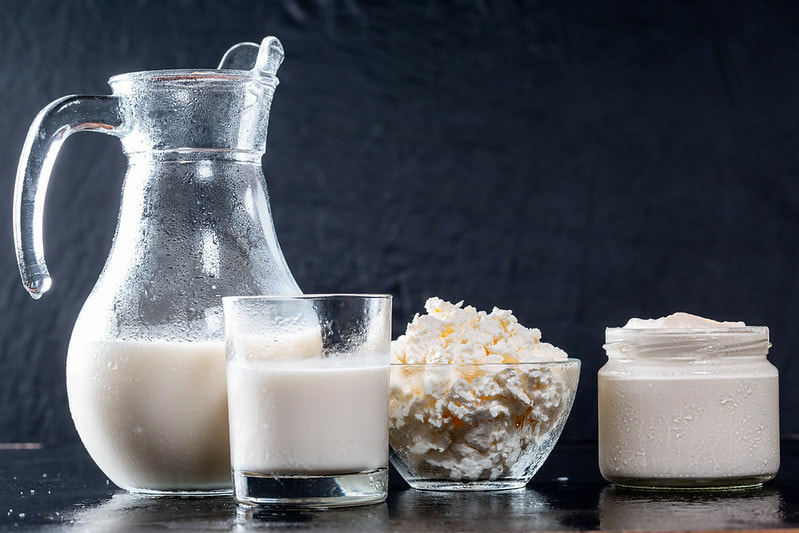|
When I need a quick nourishing meal with lots of vegetables I often make this soup. I get my daily serving of bone broth, use up my odds and ends of vegetables and have a quick lunch for days to come (unless my family gets to it first). I used bone broth from Heritage Cattle Company, a Keene, Ontario farm and distributed through, truLocal, a high-end, locally sourced meat supplier that delivers right to your door. Buying local is very important and I love that their beef is both grass fed and finished. The both is made from pure ingredients with no preservatives, additives or MSG, and no gluten. They cook it for 24 hours which is required to get the maximum nutrients from the bones.
Studies show that bone broth is beneficial for many aspects of health including: 1. our immune system - bone broth contains essential amino acids such as glutamine, arginine and cysteine. 2. our gut health - it is soothing to the stomach and helps to heal leaky gut 3. it promotes weight loss- it is believed that the l-glutamine content fights inflammation and strengthens our bones and teeth. A cup a day keeps the doctor away. Add in a pile of vegetables and you have a recipe for good health. 4. relieves joint pain and osteoarthritis - especially if eaten with phytonutrient rich vegetables which aid collagen production. Bone Broth Vegetable Soup 2 tbsp. avocado or coconut oil 1/2 cup of onions, chopped 1/2 cup celery, chopped 2 to 4 garlic cubes, minced 1/2 cup broccoli, cut in small pieces 1/2 cup cauliflower, cut in small pieces 1/2 cup carrots, chopped 1 cup mushrooms, chopped 1/2 cup peas 1 cup vegetables such as zucchini or asparagus Handful of spinach or kale 1 can of beans, black beans, navy or cannellini 6 -8 cups of bone broth Salt and pepper Heat the oil in a large saucepan and sauté the onions, celery and garlic. Add in remaining vegetables except for spinach or kale. Add broth and bring to a boil. Turn the heat down and simmer until vegetables are tender. Add beans and spinach or kale. Season with salt and pepper and any other spices you enjoy.
0 Comments
The liver is an amazing vital organ. It performs over 500 functions in the body and drives many of the critical systems in the body. It’s a power source, pharmacy, chemical factory and natural detoxification system and it works 24 hours a day.
Specifically, it is part of the digestive process: producing bile, providing us with energy, fighting infections, influencing our immune function, helping our blood to cot, regulating our hormones, cleaning our blood, metabolizing everything we digest, regulating cholesterol and helping our bodies to absorb essential minerals and vitamins. The liver has to process everything we eat, drink, breath in and put on or near our body. The average women uses 34 products while getting ready in the morning many full of toxic substances that the liver has to process. For example, if you use perfume or cologne you are absorbing approximately 48 chemicals. If you eat processed food full of additives and preservatives you are putting a straining on your liver. If you eat non-organic food, unhealthy vegetable oils, or have a diet high in sugars and low in whole foods, you are putting your liver at risk every single day. If you are taking drugs, (over the counter, recreational or prescribed) and/or are partaking in alcoholic beverages you are putting your liver and health at risk. Our liver can only take so much. A recent study provides upsetting evidence of the damage being done to this vital organ. The UK study, presented evidence that non-alcoholic fatty liver disease is on the rise among teenagers and young adults and is so bad many of the participants displayed fibrosis a precursor to cirrhosis. Fatty liver is a public health crisis and a manifestation of metabolic syndrome, a condition that leads to many fatal health issues. Fatty liver is when an abundance of lipids or fats are found in the liver and is closely associated with obesity, diabetes, heart disease and even cancer. It affects 20 to 40 per cent of the population. We are even seeing young children with liver disease due to poor diet and an abundance of sugar. . Symptoms of fatty liver disease are mild until the later stages so many people don’t know they have it until it is its more dangerous stages. You might experience fatigue,mild abdominal discomfort, and maybe nausea. Some people experience weight loss and a decrease in appetite. Of course, jaundice and fluid build up are late stage symptoms and require immediate medical attention. Fatty liver can eventually lead to cirrhosis of the liver and is linked to an increase in liver cancer. The good news is that the liver is really, really good at rejuvenating itself so it is not too late to reverse liver damage as long as it is not to advanced. Here are some tips for improving your liver function: * Reduce your use of over the counter pain pills. Tylenol contains acetametaphine which can damage the liver. Don’t exceed recommended doses and never mix with alcohol. Other prescription drugs are also dangerous. Speak to a health care professional. * If you diabetic or prediabetic control your sugar levels by eating foods low on the glycemic index. A low carbohydrate and a diet high in healthy fats can help. Fatty Liver Disease is not caused by good fats, it is a result of too much sugar and toxins. * Avoid alcohol. *Avoid sugar. (see previous posts) *Avoid toxins especially endocrine disrupting chemicals such as BPA found in plastics, and phthalates. *Try a ketogenic or Mediterranean diet both high in healthy fats and detoxifying vegetables. *Avoid packaged goods that contain refined vegetable oils, artificial foods, chemicals and preservatives, sweeteners and dyes. Avoid pesticides and herbicides by buying organic. Factory farmed meats and fish should also be avoided. * Foods that decrease inflammation while also aiding the body in the use of insulin are recommended. These would be monounsaturated fats like olives, olive oil, avocados, and nuts. Consume foods rich in omega 3 fatty acids- wild caught fish, chia seeds, and walnuts. Foods high in anti-oxidants particularly Vitamin E like sunflower seeds and almonds should be included in your diet as they help in the repair process. The liver loves bitter foods like arugula, mustard greens, dandelion, and artichokes. * Drink green tea rich in catechins. *Consider supplementing with vitamins E, C, and D. Garlic, cinnamon, ginger, quercetin, curcumin, prebiotics and probiotics help keep inflammation at bay, aid digestion and help with insulin resistance all important to rejuvenate the liver. Incorporate some of these tips for caring for your liver into your life and your liver will thank you for many years to come. Never take your liver for granted. The average person consumes too many carbs and sugars in their diet resulting in a roller coaster ride for our blood sugar levels and changing moods and energy levels. Most people don't worry about their blood sugar levels unless they have diabetes but monitoring blood sugar is important as type 2 diabetes just doesn't happen overnight, it appears after years of inconsistent blood sugar levels. This inconsistency leads to a host of health issues before you even get to diabetes and complications from diabetes are serious risk factors to longevity.
Some of the problems that result from elevated blood sugar are: 1. Nutrient Deficiencies - prevents the small intestine from absorbing nutrients such as vitamin C, D, calcium, magnesium, and chromium. 2. Energy High and Lows - high sugar foods lead to a surge of energy and then a crash. Often people use more sugar or carbs to" keep going" and an endless roller coaster ride ensues. 3. Weakens Blood Vessels and Organs - hardening of the arteries is caused by sugar which causes inflammation. Lack of oxygen and blood flow due to hardened blood vessels result in compromised organs, heart disease, eye sight issues and amputations. 4. Brain Strain -sugar consumption has been linked to brain fog, dementia, Alzheimer's, impaired cognitive ability, depression and mental health disorders. 5. Hormone Imbalances - everything we consume influences our hormones and the glands that are producing them such as the pituitary and thyroid glands. 6. Adrenal Gland Destruction - high blood sugar leads to chronically high cortisol levels putting us in a constant state of stress. 7. Fatty Liver - the liver performs 500 functions, and sugar regulation is a main function. Liver disease is rampant in our society due to high carb food, processed foods and toxins. 8. Pancreatic Stress - resulting in an inability of the pancreas to make insulin. 9. Hypoglycemia - when blood sugar levels drop resulting in fatigue, jittery feeling, trouble sleeping, mood disorders and infertility. 10. Hyperglycemia - excessive sugar intake leads to extremely high blood sugar. 11. Prediabetes - insulin resistance comes with many of the complications of diabetes such as weight gain, fatigue, slow healing, joint pain, thyroid problems and much more. 12. Metabolic Syndrome - when cells are unresponsive to insulin resulting in a host of health conditions such as heart disease. Usually diagnosed by excess belly fat. type 1 and 2 diabetes have become a major health crisis. High blood sugar levels interrupt all functions in our bodies including endocrine function, immune function, cardiovascular function and our ability to detoxify. Therefore, management of sugar levels are vital to our survival. Aside from cutting sugar out of our diet and incorporating a low carbohydrate diet, we can also add foods that aid in blood sugar regulation. Each food contains vitamins or minerals which aid in blood sugar regulation, act as insulins would, or play a role in hormone activity. They are: Almonds Asparagus Cinnamon Onions Dandelion Root Eggs Fish Kombucha Liver Olive Oil Oysters Parsley Pecans Turmeric Adding these foods into your diet is a positive step to regulating your blood sugar. Taking supplements such as chromium, or cinnamon, reducing stress levels, being in the parasympathetic nervous state for part of your day and getting a good nights sleep are also important. I hope you now understand the importance of avoiding diabetes and all its complications. Take action now and you will reap the benefits into your old age. Our bodies need bugs (bacteria, viruses, fungi, archea) to exist. These bugs, referred to as our microbiome, are a complex composition of creatures that effect our immune system, and our ability to absorb nutrients,. Declining gut bacteria are linked to increasing rates of obesity, diabetes and depression in our society.
As the levels of healthy microbiome in our stomachs have plummeted the rates of illness have soared in society. So what is destroying our microbiome? 1. the use of Antibiotics (an atom bomb for the bug culture) 2. our diet - every little thing we put in our mouths effects our microbiome 3. an increase in the pH levels of our stomach acid or low stomach acid 4. the introduction of processed and refined foods 5. pasteurization and the sanitizing of our environment and food. So what are we to do? The food industry has certainly jumped in to help solve our problems by providing us with probiotics and fermented foods. The shelves are full of yogurt, kimchi, fermented vegetables, etc. but not all contain enough bacteria to alter our gut health. Some bacteria in these products stay in our body, but most are just passing through. Of course, as they pass through they do eat, metabolize and excrete on their journey and this process does alter our microbiome but how much is questionable. Fermented foods are similiar. Most commercial products don't contain enough bacteria, or the right strains of bacteria to alter our gut biome. Hint: only buy fermented products from the refrigerated section of your grocery store. If it is not refrigerated it probably doesn"t contain enough bacteria. The most important reason probiotics and fermented foods aren't the total answer to digestive health is because our bodies might not be good "hosts" to the invited bacteria. In other words, there is no good food for the bacteria to feed off of so they leave. By changing our diet to include more fiber or prebiotics we can assist the probiotics and help them become more effective. It turns out that not only does fiber keep us regular and help control our blood sugar, it is what the microbiome like to feast on. Studies indicate that the average person only consumes 10 to 15 percent of the necessary fiber in our diet. And societies that are based on a high fiber diet have less disease and illness. including mental illness. Foods high in fiber are difficult for our bodies to digest so the microbiome love to feast on them. And conversely, if we have a diet devoid of fiber, the microorganisms will turn to eating us. This results in gut rot which leads to a host of digestive issues, food allergies and a weakened immune system. To have a healthy microbiome we need to introduce fiber rich, prebiotic foods into our diets such as: 1. Chicory root - contains inulin which nourishes the gut bacteria, improves digestion, and helps relieve constipation. Also increases bile production which helps with fat digestion. 2. Garlic, onions and leeks - contain both inulin and fructooligosaccharides (FOS) and promotes growth of good bacteria and prevents bad bacteria from growing. 3. Asparagus - promotes gut bacteria, is high in antioxidants, and may help prevent certain cancers. 4. Bananas - are rich in vitamins, minerals, and fiber. Unripe bananas are high in resistant starch which has prebiotic effects. 5. Sunchokes or Jerusalem Artichokes - are showing up at markets more often because they are full of health benefits. High in fiber, and inulin they increase friendly bacteria in colon. These are just a few of my favourite prebiotic foods that contain the special types of fiber that support digestive health and work with your probiotics to improve your immune system and prevent certain diseases. 'Try them today and your gut will thank you! |
AuthorSusanne Jakubowski is a holistic nutritionist, yoga teacher, Thai Yoga Therapist, and cancer survivor. CategoriesArchives
January 2022
|
Photos from mripp, nikita_nikiforov, photoheuristic.info, focusonmore.com, Jeanne Menjoulet, Scouse Smurf, Ktoine, verchmarco, Kris Krug, U.S. Army Space and Missile Defense Command (SMDC), wuestenigel, verchmarco (CC BY 2.0), Bernt Sønvisen, verchmarco, wuestenigel (CC BY 2.0), Alizarin Krimson, nillamaria, verchmarco, Per Harald Olsen, trendingtopics, wuestenigel, Markus Binzegger, JIRCAS, forthwithlife, colinpoe, BladDad, Stephen Pearson, UNDP Ukraine, GreenFlames09, jlodder, mealmakeovermoms



 RSS Feed
RSS Feed
